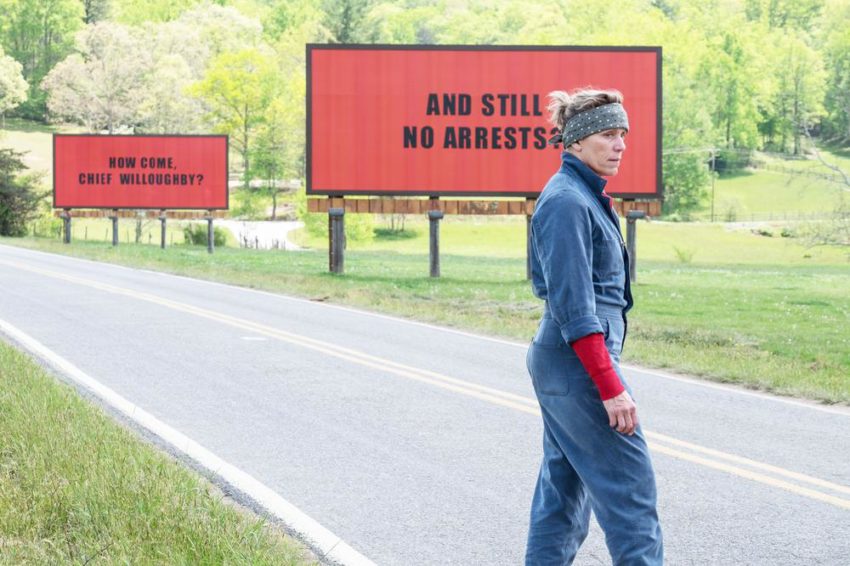
Martin McDonagh has made his name off knocking-off other, better filmmakers. He started with Tarantino, and with his latest, “Three Billboards Outside Ebbing, Missouri”, he seems to have moved onto the Coen brothers. Despite his lack of a distinctive style, I did like “Seven Psychopaths”. Its adolescent tone was a good offset to the kind of film he was trying to make. “Three Billboards” is also not bad, but not as explosive as some of the reviews are making it seem.
Mildred Hayes (Frances Mcdormand) lost her daughter to a murdering rapist several months ago. She is pissed about this fact, and while not sobbing with grief every night, it’s clear that she’s still in mourning. She purchases three billboards chiding the police over their lack of progress. This draws a lot of attention and puts her and Chief Willoughby (Woody Harrellson) in each other’s crosshairs.
The film’s portrayals of grief and coping with death are grounded and striking. Hayes is not dramatic, but rather uncompromising and matter of fact. She’s been through the grief, she knows what she wants, and is disinterested in changing it. Willoughby is moving through his life, looking for a pragmatic way to deal with his cancer even though he knows his time is limited. There’s nothing about their conflicts that feels cliché, it all seems natural and human.
McDonagh also makes a wise judgment call in making “Billboards” as an ensemble piece. He uses these people to help build and fleah out the town. That is a good segue into the strengths of the acting, and from McDormand particularly. McDormand is enjoyable as this anti-Marge Gunderson; a challenging, quasi-sympathetic degenerate, Mildred is interested in her own goals over everyone else’s and has complete confidence in herself. She is completely committed and proactive in pushing for the finding and capture of her daughter’s killer. There will be more on Sam Rockwell’s officer Dixon in a moment. While he is good and chews through the dialogue like a pro, it often seems like McDonagh didn’t know what he wanted out of the character. Some others like Peter Dinklage, Caleb Landry Jones, John Hawkes and Clarke Peters make positive impressions.
The biggest problem with “Three Billboards” is the script. Its not that profanity in movies is a bad thing, but “Three Billboards” makes me question its purpose. McDonagh had written in excessive swearing into “Seven Psychopaths”, but that movie wasn’t particularly mature and its clear he wants to be taken more seriously here. He’s still writing the same way, and it leads to a confused voice throughout the film. The usage of the N-word in “Three Billboards”, while plausible, also seems to have been jackhammered into the film. Even the characters that are supposed to be ‘good’, use it on a regular basis.
The most logical point of comparison would be Jimmy in Pulp Fiction. When Jules and Vincent arrive at his house and are waiting for the help in dumping a body and cleaning their car, Jimmy goes on a racist tangent. Tarantino is showing a different variant of racism than what’s shown in the media, he takes the run of the mill suburbanite and lays what they’re thinking on the table. That’s a staple throughout the whole screenplay, but this scene is where it’s the most noticeable.
Where is the bite in “Three Billboards?” Why write these characters like that if you do not have something in mind that you want to convey?
“Three Billboards Outside Ebbing, Missouri” has a lot of merit to it, but its haphazard writing will often get in the way.
Written by Jeff Turner





